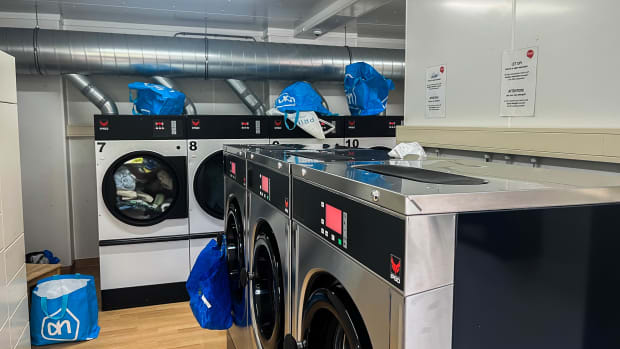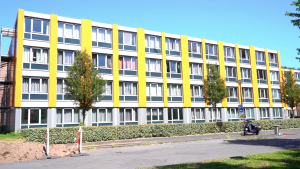
Washing machines at Spinoza Campus hacked, Duwo refuses to pay for costs
An unknown perpetrator hacked five washing machines on the Spinozacampus. For weeks, the hacker took control of the payment system, allowing students to do their laundry for free. Duwo therefore closed the laundry room in July. More than a thousand students have been unable to do their laundry there.
Five washing machines in a laundry room on the Spinozacampus were suddenly hacked in July. The built-in digital payment system of the washing machines was also taken over several times during the hacks. This allowed students to do their laundry for free for weeks.
Duwo refused to continue to bear the costs for the 1250 residents. ”Because we purchase the machines ourselves, we need the income to be able to continue offering laundry services to our residents at affordable prices,” says a spokesperson for Duwo. In mid-July, the student housing provider blocked access to the machines. Duwo was unable to trace the perpetrator of the laundry hack.
Hacking washing machines is a first for housing associations. Housing providers Ymere, Stadgenoot and Hotel Casa had also never had to deal with hacked machines before.
Itch
Since July, residents have been able to use Duwo's ten analogue machines on Darlingstraat next to the campus. However, according to a video in Folia's possession, these are occasionally almost completely out of order. One resident says that due to overload, there is often only one washing machine available for 1,250 students. The student is afraid of an itch outbreak due to the “risk of lice.”
However, most residents say they have more trouble with the heat on the Spinozacampus than with the laundry gate. “Hacked? Washing machines? How clever,” says a Media & Information student in surprise. In a small survey, many students say they already wash more often on the quieter Darlingstraat. There are more machines in that laundry room, so there are fewer queues.
Hacking students
According to hacking expert Ruwhof, hacking into smart devices is a growing trend. “Smart devices, such as some speakers, washing machines or televisions, are connected to a network. Using a programme on your laptop, you can take control of a washing machine.” Hacked devices can then control the connected internet connection, warns Ruwhof. “If thousands of those hacked internet connections simultaneously go to a large website such as NOS, that website will be down in no time.” A hacked washing machine can therefore not only be used for free washing, but also for a cyber attack.
However, tracking down a hacker is often complicated and costly, says ethical hacker Sijmen Ruwhof. He suspects a professional on the Spinoza campus rather than the students. 'There are lots of bright minds on that campus who also know how to program.' Students are often curious, says Ruwhof. 'It gives you a huge kick when you hack into a washing machine like that.'
Prison sentence
According to the law, hacking into a device can be punished with a year in prison. If money is stolen as a result, as in this case with the Duwo washing machines, you could even face up to six years in prison. Ruwhof: “If you are a student and you ever manage to hack a washing machine, report it immediately. If you abuse it yourself by washing your clothes for free, the court will probably consider you a criminal.”
Duwo has decided to switch back to analogue versions. The student housing provider expects to receive the five washing machines in mid-September. Other housing associations are already using analogue machines exclusively. Ruwhof emphasises that non-smart appliances, if available, are a wiser choice for residential properties anyway. This prevents hacks of personal data and cyber attacks. “If I were a student and saw those digital washing machines, as a hacker I would be getting the itch too.”




